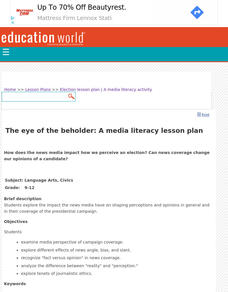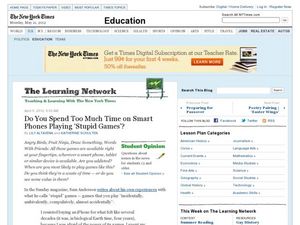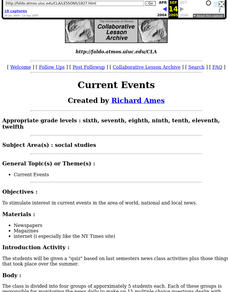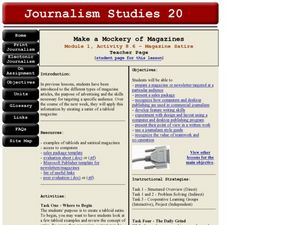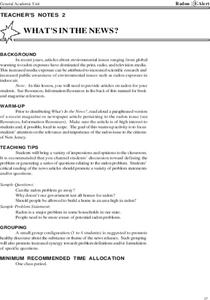Curated OER
Hurricane Katrina: You Be the Reporter
Students work in a small group to create news stories, feature stories and editorials/letters to the editor and organize them in a podcast, video-based program, or newspaper/magazine focused on Hurricane Katrina.
Curated OER
Your Angle on the Story
Students review several articles on same current event, and then cover news issues themselves while assuming secret identities of various individuals who have vested interests in issue. Students write newspaper articles from these...
Anti-Defamation League
Is Olympic Coverage Sexist?
Women Olympians have come a long way since 1900 when 22 women competed for the first time. News coverage of the Olympics has also changed dramatically. What has been slow to change, however, is the language used in the coverage of female...
Curated OER
The Eye of the Beholder: A Media Literacy Activity
High schoolers explore the impact the news media have on shaping perceptions and opinions in general and in their coverage of the presidential campaign.
Curated OER
Writing Summaries
Practice summary writing with informational texts. Young readers create summaries after reading magazine articles, newspaper articles, or other forms of informational texts. Readers use the GRASP strategy (read text, write what you...
Academy of American Poets
Teach This Poem: “Making History” by Marilyn Nelson
What makes an event newsworthy, worth a reference in a news magazine or textbook? Who decides? These are questions Marilyn Nelson asks readers of her poem "Making History" to consider. To begin, class members list details they notice in...
Curated OER
Comparing News Sources: Where Would You Turn?
Students follow the study of Ray Bradbury's Fahrenheit 451 and attempts to connect the thematic underpinnings of the novel to Students' own lives.
Curated OER
Mr.Bubble's News
Second graders use a double bubble thinking map to compare newspapers and magazines. They browse through magazines and newspapers to identify characteristics of each type of text and find 5 features for each type of text. They share...
Curated OER
What's in the News?
In this analysing articles worksheet, students read two newspaper articles about the issue of radon and answer six questions that allow students to reflect on how the articles were written and what is left unknown to the readers.
Newseum
Editorials and Opinion Articles
Reading the news is fun, and that's a fact! With the lesson plan, scholars differentiate between fact and opinion as they read editorial articles. They complete a worksheet to analyze the information before writing their own editorials...
Curated OER
What's New in the News?
Students explore the news. They research Internet news sites, newspapers, and magazines and select four areas to summarize. They simulate a news announcer by summarizing the news and including supporting details for a particular day.
Curated OER
Getting the Word Out: From Gutenberg's Press to Zines
High schoolers examine the effects of Gutenberg's printing press on the world. Using this information, they create their own Zines or internet magazines about a social issue of their choice. They share their magazine with the class for...
Curated OER
Archaeology In The News
Pupils investigate the different articles of archaeology that is found in a variety of research and news resources. They read one of the selections and complete the worksheet as a guide to writing a summary of the article. Students...
Curated OER
Media Coverage
Students research news coverage to examine how a local issue does not receive fair attention in the news. In this new coverage instructional activity, students discuss where they get their information and why some issues are ignored....
Curated OER
Student Opinion: Do You Spend Too Much Time on Smart Phones Playing 'Stupid Games'?
This versatile resource from The New York Times website provides a short opinion piece on smart phones and the amount of time we spend playing games on them as well as several possible writing prompts pupils could consider in response to...
Curated OER
Electronic Media
Students compare forms of electronic media. They watch a news broadcast and take notes on the content being conveyed. After viewing the broadcast, they read newspaper articles or news magazines to locate articles with similar content to...
Curated OER
Combing Through the News
Students use the Sean 'Puffy' Combs trial to compare how and why various media cover a news story differently.
Curated OER
Current Events
Here is an ongoing activity intended to build interest in local, national, and world news. The class is divided into four groups of approximately five students each. The groups are responsible for monitoring the daily news. They compose...
Curated OER
Make a Mockery of Magazines
Learners examine tabloids. In this journalism lesson, students compare and contrast satirical magazines and then plan, write, and compile their own.
Curated OER
Keeping News Trustworthy
Students analyze media sources. In this media awareness lesson, students consider media outlets as businesses and discuss how they present information. Students keep media logs and analyze selected newspapers, magazines. or television...
Curated OER
What's in the News?
Students discuss any news article or video about the environment. They develop their own questions relating to radon and how it effects people and the environment. They answer each others questions to end the lesson.
Curated OER
Using a Graphic Organizer to Critically Observe Televised News Broadcasts
Students compare two television news broadcasts. They discuss how to organize information when comparing two objects and read and discuss two books to create a Venn diagram to compare both books. After creating the diagram, they view...
Curated OER
Video Game Violence: Explore Possible Impacts
Introduce middle schoolers to the issue of video game violence with a multifaceted approach. Learners complete a gaming survey, as well as read and discuss a news feature about violent video game sales and a handout on stimulus...
Curated OER
Eisenhower: The Cold War
Students participate in a news conference simulation. In this Cold War lesson, students research events of the conflict during Eisenhower's presidency and use the information to script and participate in a news conference with Eisenhower.





